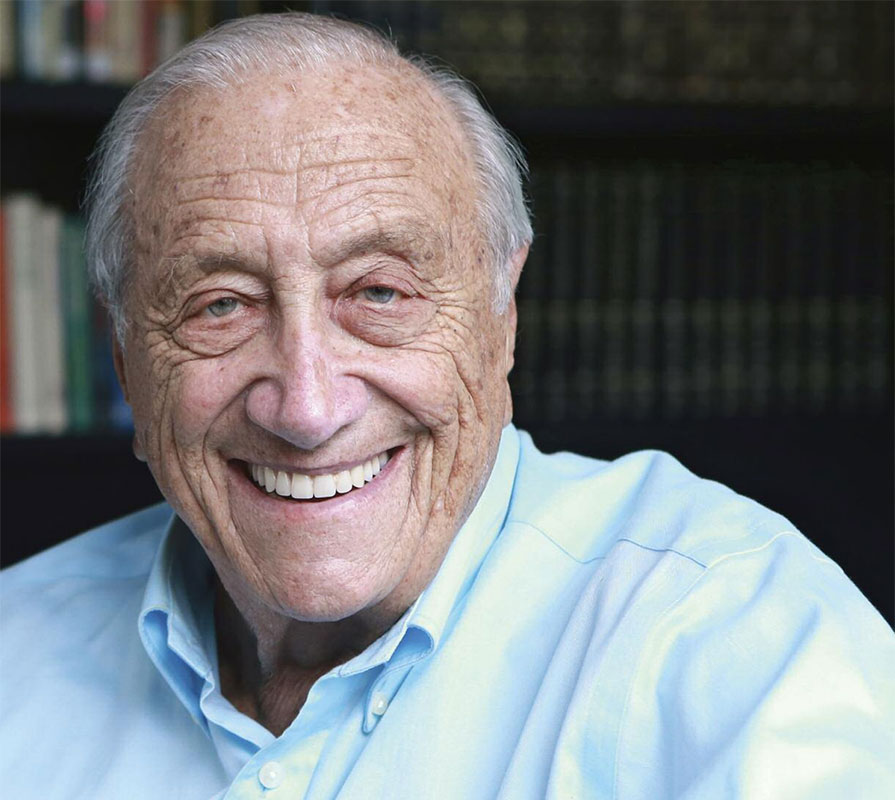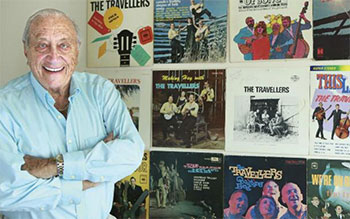Canada’s Favourite “Traveller”
By Tom Douglas and Photos by John Major
Jerry Gray continues to walk that ribbon of highway.
If the musical phrase “…from Bonavista to Vancouver Island…” rings a patriotic bell, you have Jerry Gray to thank — at least in part — for bringing back some happy memories of more innocent times.
Jerry is a founding member of The Travellers — Canada’s legendary band of minstrels who composed and recorded the Canadian lyrics to U. S. folk singer, Woody Guthrie’s, renowned This Land Is Your Land. Their rendition caught fire north of the border and rivalled trumpeter Bobby Gimby’s pied-piperish CA-NA-DA as the theme song for the feel good celebration of this country’s 1967 centennial.
As Canada prepares for next year’s 150th anniversary — also known by the tongue-twisting designation “sesquicentennial” — Canadians will no doubt be singing lustily again about “roaming and rambling” from the Arctic Circle to the Great Lake waters, reaffirming that “this land was made for you and me.”
Jerry, now a young 82, expects to be belting out the words to This Land Is Your Land and other iconic folk songs during the lead-up to and the actual celebration of Canada’s 150th birthday. He’ll be accompanying himself on the banjo, just as he has done since the 1950s when another folk legend, the late Pete Seeger, personally encouraged him to take up the musical instrument. Pete — internationally famous for composing and singing such protest songs as Where Have All The Flowers Gone?, If I Had A Hammer, and Turn! Turn! Turn! — entertained from time to time at Camp Naivelt (Yiddish for “NewWorld”), a vacation site near Brampton, Ontario for the Jewish working class that Jerry regularly attended along with his parents and sister, Helen.
Jerry and Helen were two of the original members of The Travellers, along with Sid Dolgay, Oscar Ross and Jerry Goodis. Helen, Sid and Jerry Goodis (who later founded a highly successful advertising agency) are deceased, while Oscar left the group early on to take up another career in the performing arts as a mime. Over the years, a number of talented singers and musicians have stepped up to the microphone to take the place of band members who had died or gone on to other pursuits.
These days, the fan base and the concerts have understandably diminished, but Jerry still soldiers on, fronting a group he calls Jerry Gray andTheTravellers at tributes to Woody Guthrie, Pete Seeger and others, while also lecturing about the history of folk music as a form of protest at universities near his winter residence in Deerfield Beach, Florida.
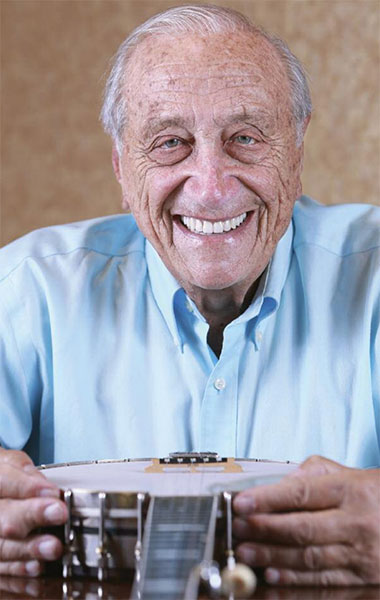 “It was Pete Seeger who inspired me to learn to play the banjo,” says Jerry, seated in the den of his Thornhill condo in North Toronto, surrounded by memorabilia of his more than 60 years in show business.
“It was Pete Seeger who inspired me to learn to play the banjo,” says Jerry, seated in the den of his Thornhill condo in North Toronto, surrounded by memorabilia of his more than 60 years in show business.
“Early in his career, Pete produced a very simple booklet entitled How To Play The 5-String Banjo that his wife cranked out on a Gestetner machine [an early copying device]. When he gave me the booklet on one of his frequent trips to Toronto, I bought a used banjo from a pawn shop, purchased a few Pete Seeger records and taught myself to play.”
It was also Pete Seeger who suggested The Travellers include This Land Is Your Land in their repertoire of folk and protest songs. The tune had been virtually banned from the airwaves in the United States during the Senator Joe McCarthy communist witch hunts of the 1950s. Because of his leftist leanings, Woody Guthrie was the target of the red-baiting tactics of Senator McCarthy and his cronies, who held sway during one of the more shameful eras ofAmerican history.
“It’s hard to believe that a song’s lyrics could be banned simply because it suggested that the land belongs to all people,” says Jerry.
“But those were different times and we gladly took Pete up on his invitation. He had the right to make such a suggestion because Woody was his best friend. They travelled all over singing their songs of protest against social injustice.”
Jerry can’t recall who in the group came up with the wording to the Canadian-focused verse that begins and ends their version of the song.
“It was a joint effort, “he says. “We were leading contestants in a CBC-TV series called Pick The Stars and we got all the way to the semi-finals [beating out impressionist Rich Little], with This Land Is Your Land proving a big hit with the studio audience and home viewers alike.”
The Travellers parlayed the success of their television appearances into a recording contract. Over the next few decades, they would produce 16 albums and five specials on Canadian television while entertaining audiences around the world through personal appearances. Ironically, the group never made a cent in royalties out of their most-famous offering. Jerry says Pete Seeger mentioned to them that Woody Guthrie had fallen on hard times and was in poor health.
The Travellers readily agreed to donate all proceeds from the song to theWoody Guthrie Foundation and that magnanimous gesture still stands today. Another pro bono undertaking by Jerry involved a cartoon character, Murphy the Molar. Many of his fans would be surprised to learn that Jerry practised dentistry in Toronto for decades in addition to performing with The Travellers.
The group downplayed their day jobs, thinking the public might not consider them professional musicians if they weren’t at it full time. Because of his other vocation, Jerry couldn’t resist a plea from a fellow dentist in Ontario’s public health system to donate his time to the recording of a public service announcement urging kids to take care of their teeth.
Ryerson University’s film department produced the 30-second television pitch and Jerry provided the voice-over, complete with banjo accompaniment.
Patriotic Trailblazers
Pete Seeger’s influence almost saw the group choosing another name for themselves in their start-up days.
Pete was a member of a highly popular folk group called The Weavers, and the Canadian group, as a salute to their American counterparts as well as their homeland, seriously considered calling themselves The Beavers. Fortunately, they admired a Weavers’ song called Lonesome Traveller and decided to use it as the inspiration for their stage name.
Because they performed as a close-knit ensemble — and perhaps because there have been so many replacements for the other members of the group over the years — the individual Travellers never became famous in their own right as did other Canadian stars like Gordon Lightfoot, Ian & Sylvia, Neil Young and Joni Mitchell. Yet the “firsts” they racked up make some other Canadian stars dim by comparison.
For instance, Jerry proudly claims that The Travellers opened the door for other traditional groups when they decided to start a Canadian folk singing ensemble in 1953. As he has said in numerous newspaper interviews over the years: “We weren’t just a rarity in Canada as we toured from coast to coast — we were the first. We played in Ukrainian Halls, Finnish Halls and in all the other venues rented by labour-oriented organizations. They were pretty well the only segment of our society interested in folk music at the time.”
The group also worked with the organizers of the Mariposa Folk Festival to get the musical ball rolling in Orillia, Ontario in 1961. Their subsequent performance at the event helped make this annual songfest the popular gathering it still is today. They would return for gigs at the second and third Mariposa hootenannies. Jerry points out they started the tradition of celebrating Canada’s birthday in song on Ottawa’s Parliament Hill.
It was July 1, 1962 and we were the headline act. We would perform there for years and were particularly proud to play a major part in the festivities during Canada’s 1967 centennial birthday party.
“The very next day after that first Hill performance, the group boarded an Aeroflot flight for a three-week, 19-stop cultural exchange tour of Russia. What made that trip unique was it came at a time when the United States and the Soviet Union were missile-rattling over the U. S. invasion of Cuba at the Bay of Pigs. It was also the first cultural exchange between Canada and the USSR since the end of the Second World War.
The Travellers’ record company, Columbia Canada, hadn’t planned on producing an album of the Russian performances, but when it was learned that Soviet television was filming the tour, the group asked for and received copies of the tapes. When much of the material proved not to be up to North American broadcast standards, TheTravellers re-recorded many of the songs they had sung — with the voice of the Russian master of ceremonies and crowd reaction dubbed in.
The result was the popular album, The Travellers On Tour. The group was also front and centre when Queen Elizabeth II and Prince Philip, Duke of Edinburgh, made a royal visit to Charlottetown, P. E. I. in 1964. TheTravellers were part of a Command Performance that was hosted by the late Lorne Greene, who was starring at the time as the patriarch of the blockbuster television western Bonanza.
While hobnobbing with the Royal Couple at a private reception after the performance, the group became innocently embroiled in an international incident over the misinterpretation of a remark by Prince Philip. The Queen’s husband is infamous for making controversial public statements, but Jerry contends that in this particular instance, the duke was misquoted.
“The Beatles were on an international tour and Prince Philip said to us that we should visit England — which we did the following year — now that the Beatles are away, “Jerry recalls.
“The press hadn’t been allowed in to this gathering, but a public relations person later related the prince’s remark to the media waiting outside the room. One of the British journalists reported the remark as ‘…now that the Beatles are on the wane…’ and this caused a furor in Great Britain.”
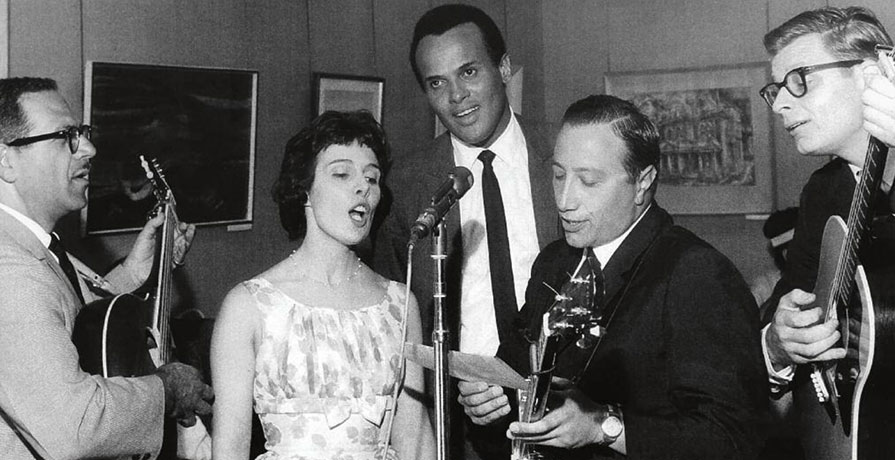
Access Denied
That tempest in a British teapot was mild compared to some of the other “downers” the group experienced during their career. In 1963, they were denied entry to the United States when they announced plans to sing at rallies in support of Martin Luther King, Jr. Undeterred, they held a fundraiser for the civil rights leader’s cause in Toronto alongside Harry Belafonte and Canada’s renowned pianist, Oscar Peterson.
As Jerry told one interviewer: “The protest movement of the 1950s and ‘60s had to do with things that really needed changing as people became aware of the inequities of society around the world — like apartheid, Vietnam, and black civil rights issues in the U. S. “The group was again refused entry into the U. S. in 1965 and Jerry learned through the grapevine that it was partly due to the fact that they had ties to the leftist Camp Naivelt.
Their names were on a blacklist with U. S. customs authorities under a draconian law that took years of hard work by a member of the United States Congress to get rescinded.
“We were on our way to a gig with the Great Lakes Orthodontics Society based on having sung at a gathering of the parent body in Toronto, “ Jerry recalls.
“I told the customs official that we had sung for the Queen and had the highest security that you could ever find. All I got was a response that if we volunteered to go back to Canada it wouldn’t go on our record — so of course we complied.
“Jerry has weathered setbacks in both his chosen careers. For instance, the cross streets where his fledgling Toronto dental practice was located were closed for lengthy repairs. Since no patients could reach the office, Jerry and his wife Greta made good use of the time with an extended tour of Europe that included a memorable trip on the Orient Express from Paris to Vienna.
While inAustria, the couple received an invitation from a new-found friend to visit Poland — and that experience, coupled with the revelation of the atrocities perpetrated by Russian dictator Joseph Stalin, banished forever Jerry’s idealistic belief in a Soviet utopia.
“It was the darkest city, literally and figuratively, I’d ever been in, “he says. “Neon light obviously hadn’t penetrated the Iron Curtain. “Of all the adversities Jerry has had to overcome in his life, the hardest to deal with was the death of the eldest of his four sons, James, at the age of 52 in the summer of 2013. The former keyboardist for the highly successful Canadian band Blue Rodeo — who also filled in on a number of occasions with The Travellers — collapsed on a Toronto street while walking home from a musical engagement.
“I was at a regular poker night with seven or eight friends when my wife called and said James had been taken toToronto General Hospital,” Jerry says wistfully, but with an inner strength he admits has helped him come to grips with the tragedy.
“Someone else had driven me that night so by the time he got me back home to pick up my car, Greta phoned again and said James was gone.
“An autopsy revealed the musician had died of a massive heart attack that was the result of severe diabetes, an affliction he hadn’t been aware he had.
“James didn’t take good care of himself,” Jerry asserts. “That’s why proceeds from ongoing tributes to him [at which Jerry performs] are donated to helping street people and to a bursary in his name awarded to struggling musicians in the GTA. His legacy is that he made every band he ever played with sound better.”
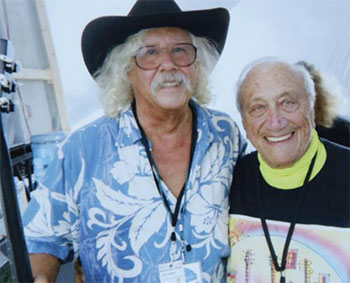 Accolades Abound
Accolades Abound
Jerry himself has been the recipient of a number of tributes and accolades over the years. In 2001, he received a Lifetime Achievement award from the Canadian and American Musicians Union and by the Ontario Federation of Labour and the Canadian Labour Congress.
In 2010, Pete Seeger was one of a number of influential people who wrote letters of support that resulted in Jerry being the only Canadian to be nominated for and presented with the Labor Heritage Foundation’s Joe Hill Award — named for a radical songwriter and social activist who was executed in the United States early in the 20th century on what a number of people at the time believed were trumped-up murder charges.
Jerry points out proudly that some other recipients of the award are Pete Seeger and Cesar Chavez, an American farm worker and civil rights activist who co-founded the National FarmWorkersAssociation. Top of the list of Jerry’s many achievements is his conducting of the Mormon Tabernacle Choir and Orchestra in an emotion-packed rendition of the Canadian version of This Land is Your Land on June 28, 2011 at Toronto’s Roy Thomson Hall.
“When I saw the name ‘Mormon Tabernacle Choir’ come up on call display on my telephone, I figured it was a fundraising campaign they wanted me to donate to,” Jerry says with a grin that slowly spreads from ear to ear.
“Imagine my surprise and delight when the woman at the other end of the line asked me if I would do them the honour of conducting the choir and orchestra in their final concert number that night. I said, ‘Do YOU the honour? I think it works the other way around!’
She went on to explain that the group always closes its concerts in the U.S. with the American version and they thought it fitting that they close the Toronto show with the Canadian version. The place was sold out and I got a standing ovation from the audience as well as the choir and orchestra. I was thrilled beyond belief.”
While the gigs have slowed down over the years, Jerry maintains that he hasn’t and doesn’t intend to.
“I keep telling people I’m still doing the things I did 20 years ago. My wife keeps my ego in check, though, by adding, ‘But not as well!’” Greta’s good-natured kidding aside, Canadians will learn to their delight over the next 18 months or so just how well Jerry still belts out those stirring lyrics toWoody Guthrie’s immortal folk anthem.
This Land is Your Land
(Canadian lyrics by The Travellers)
This land is your land, this land is my land,
From Bonavista, to Vancouver Island.
From the Arctic Circle to the Great Lakes waters,
This land was made for you and me.
As I went walking that ribbon of highway,
I saw above me that endless skyway.
I saw below me that golden valley,
This land was made for you and me.
I roamed and I rambled and I followed my footsteps,
To the sparkling sands of her diamond deserts.
While all around me a voice was sounding,
Saying this land was made for you and me.
The sun came shining, and I was strolling,
And the wheat fields waving and the dust clouds rolling.
As the fog was lifting, a voice was chanting,
This land was made for you and me.
This land is your land, this land is my land,
From Bonavista, to Vancouver Island.
From the Arctic Circle to the Great Lakes waters,
This land was made for you and me.
Used with permission. Woody Guthrie’s lyrics are ©1956 (renewed 1984), 1958 (renewed 1986) and 1970 TRO-Ludlow Music, Inc. (BMI) and TRO Essex Music Group



